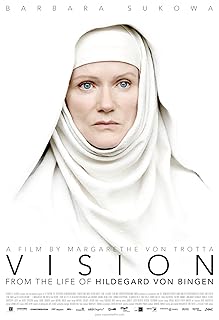電影訊息
夢想-希爾德佳德的一生--Vision - Aus dem Leben der Hildegard
編劇: 瑪格麗特馮卓塔
演員: 芭芭拉蘇可娃 海諾費爾希 漢娜荷絲普隆 Mareile Blendl
灵视/直观/梦想
導演: 瑪格麗特馮卓塔編劇: 瑪格麗特馮卓塔
演員: 芭芭拉蘇可娃 海諾費爾希 漢娜荷絲普隆 Mareile Blendl
電影評論更多影評

2013-06-13 02:15:36
以Vision之名 : 張揚女權(神聖先知/神聖大愛)
《Vision – From the Life of Hildegard von Bingen [Aus dem Leben der Hildegard von Bingen]》
[DVD 版, 111分鐘]
導演/編劇 : Margarethe von Trotta
曾經是1970年代女權運動主角之一的Margarethe von Trotta在拍攝
《Rosa Luxemburg》時就已對Hildegard von Bingen(女性主義者的偶像)的傳奇
有所整理;但是,因為許多困難,她必須在15年後才能真正完成《Vision》這部電影...
Hildegard von Bingen所處的時代已是
中世紀(約公元476年--公元1453年)[是歐洲歷史上的一個黑暗時代(主要是西歐)]
的(男性)神權主導(歐洲)一切的後期...
Hildegard
在年幼時就被家庭大力培養成為
Benedictine 教會的修女(nun)...
電影進行到第30分鐘前後,
女性與男性的政治角力(透過神權)正式開始
(之前,在選院長[magistra]時,由所有修女選出/而不是經過男性神父的任命,
只是一個暖身[女性與男性的政治角力])
---〉 上帝只給予一位年輕修女: Vision? 而不是給予任一有神權的(男)神父?
這大大的羞辱了男性當權者!
「上帝要傳達啥...」 (一位男性神父質問Hildegard [Barbara Sukowa 飾演])
[===》從編導的前前後後影像可以暗示出 : 女---男 平等!]
這些『既得利益』的男性神父最後給予Hildegard『異教徒』的罪名,
(懷疑Hildegard感受到的Vision是來自『魔鬼』?)
準備將她逐出教會/修道院!
(慶幸: 不是處死Hildegard!)
Margarethe von Trotta很高明的在此部神學電影內大力張揚女性主義/政治!
電影內的一個主線是Richardis [Hannah Herzsprung 飾演] 加入了修女的行列...
(當電影進行到約第37分鐘後)
---> 女人間的妒嫉/猜忌 存在於 修女Jutta [Lena Stolze]、Hildegard與Richardis之間...
一個小插曲是修女Clara被同一修道院內的某男性修士引導
---〉破壞了『貞潔/處女』 (修女Clara因為不想離開修道院而選擇了自殺...)
這件意外讓Hildegard決定『自立門戶』
帶領一群修女離開由男性神父主導的舊修道院
到Rupertsberg (在Nahe河/Rhine河交匯旁)另建自己的修道院...
(這當然又是女性與男性的政治角力 ---〉Hildegard 藉口是 Vision的指引...)
===> 在此段,編導暗示了男性(相對於異性/女性)的性誘惑對修女(如修女Clara)生命的破壞...
(估計,會有不少『大』女性主義者會因此段戲而叫好!)
男/女的決裂 (因為對『性/慾望』的保持距離的程度大不相同),在此到達高潮!
很自然,原本存在於修女(女性)間的『不和諧』也終於在此爆發
(女性得在山野間自力更生並自己動手建修道院!)...
---> 幸好有Marchioness Richardis von Stade家族(貴族)的支持與幫助!
電影在進行到約76分鐘時,編導展示了Hildegard所創作的(可能是流傳最古老的morality play)
音樂劇 Ordo Virtutum [Play of the Virtues]部份的排演...
6分鐘之後, 影像顯示出,在家族(貴族)的壓力下,
修女Richardis要離開Hildegard,
自立門戶...
這可能是電影內最悲情的時刻(相對於Hildegard [女性] 的『愛』)...
電影的結束前 Brother Volmar [Heino Ferch] 『跟隨』Hildegard ...
讓個人懷疑 Brother Volmar 『影射』編導 Margarethe von Trotta (如果她自比Hildegard)
的丈夫
(電影導演 : Volker Schlondorff,
此人曾幫助
導演
姜文
完成
《陽光燦爛的日子》的後期製作)。
2013年6月10日觀影 [http://www.qweyy.com]
2013年6月12日整理
------
http://en.wikipedia.org/wiki/Vision_%E2%80%93_From_the_Life_of_Hildegard_von_Bingen
Barbara Sukowa 飾演 Hildegard of Bingen
Stella Holzapfel 飾演 Hildegard as a Child
Heino Ferch 飾演 Brother Volmar
Hannah Herzsprung 飾演 Sister Richardis
Mareile Blendi 飾演 Countess Jutta von Sponheim
Sunnyi Melles 飾演 Marchioness Richardis von Stade
Alexander Held 飾演 Abbot Kuno
Lena Stolze 飾演 Sister Jutta
Paula Kalenberg 飾演 Sister Clara
Annemarie Duringer 飾演 Abbess Tengwich
Devid Striesow 飾演 Emperor Frederick Barbarossa
---------------------------------
Saint Hildegard of Bingen, O.S.B.
(German: Hildegard von Bingen;
Latin: Hildegardis Bingensis) (1098 – 17 September 1179),
also known as Saint Hildegard, and Sibyl of the Rhine,
was a German writer, composer, philosopher, Christian mystic, Benedictine abbess, visionary,
and polymath.
Elected a magistra by her fellow nuns in 1136, she founded the monasteries of Rupertsberg in
1150 and Eibingen in 1165.
One of her works as a composer, the Ordo Virtutum, is an early example of liturgical drama
and arguably the oldest surviving morality play.
She wrote theological, botanical and medicinal texts, as well as letters, liturgical songs,
and poems, while supervising brilliant miniature illuminations.
Although the history of her formal recognition as a saint is complicated, she has been
recognized as a saint by parts of the Roman Catholic Church for centuries. On 7 October
2012, Pope Benedict XVI named her a Doctor of the Church.
http://en.wikipedia.org/wiki/Hildegard_of_Bingen
---------------------------------
"從賓根的希德格(Hildegard of Bingen) 的神秘主義探討十二世紀的女性意識"
何麗霞 舉報
評論

